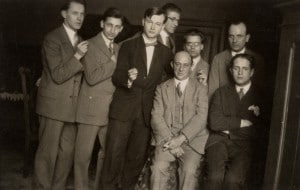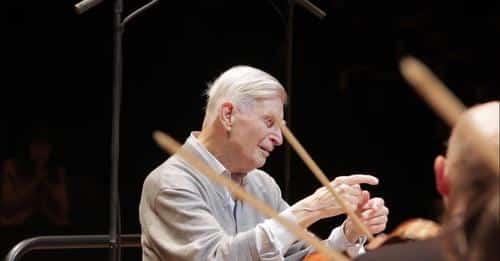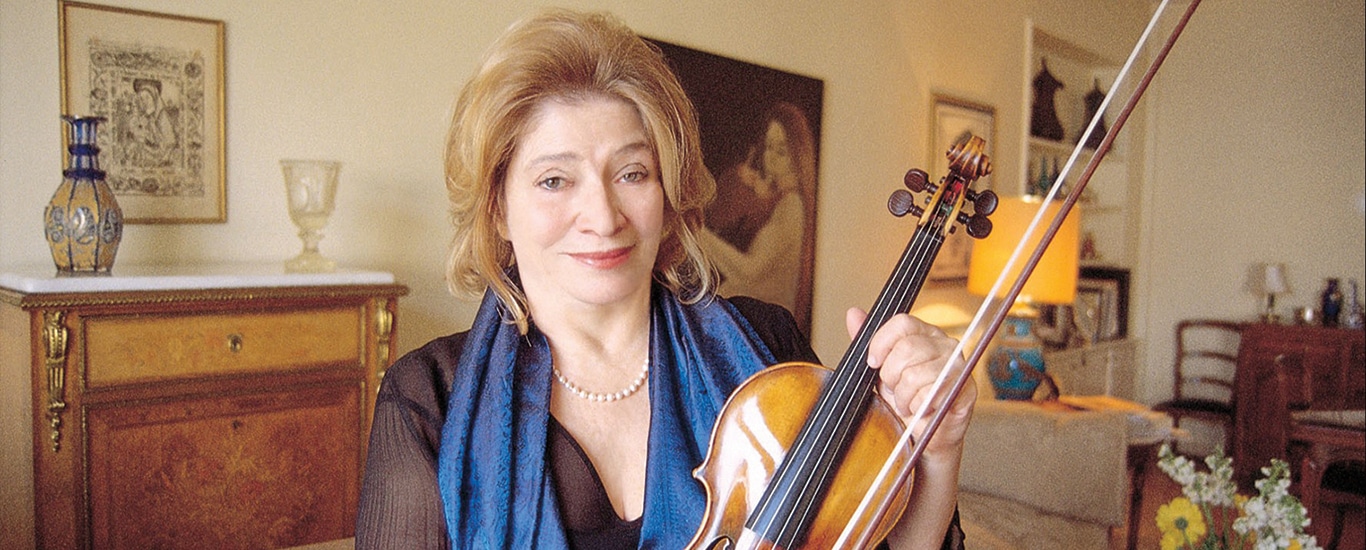Berlin announces Schoenberg big bang
main
norman lebrecht
April 20, 2015
Moses und Aron opened this weekend at the Komische Oper, but that’s just the prelude.
In September,the Berlin Festival will perform 19 works by Arnold Schoenberg, who lived in Berlin from 1902 to 1903, and again from 1926 to 1933 as masterclass teacher at the Prussian Akademie der Künste.
Among the festival works will be Die Jakobsleiter (Jacob’s Ladder), never finished and seldom performed. Details below.
For starters, see how many students you can identify in this masterclass picture.

press release:

Musikfest Berlin 2015 dedicates one of its festival focal points to composer Arnold Schönberg
Together with the Deutsches Symphonie-Orchester Berlin, the Berliner Festspiele present the rarely performed oratorio “Die Jakobsleiter” by Arnold Schönberg in September as part of the Musikfest Berlin 2015. Schönberg the composer is among the thematic focal points of this year’s festival.
The Musikfest Berlin 2015 (2 – 20 September) presents Arnold Schönberg’s “Die Jakobsleiter”, an oratorio that was never completed, at the Philharmonie on17 September. The early counterpart to the opera “Moses und Aaron”, which celebrated its premiere at the Komische Oper Berlin on 19 April, represents Schönberg’s interest in Judeo-Christian spirituality, and is a milestone in his extensive oeuvre.
The work, which is rarely realized because of the elaborate production required, will be performed at the Musikfest Berlin 2015 by the Deutsches Symphonie-Orchester Berlin and the Rundfunkchor Berlin under Ingo Metzmacher, featuring soloists Thomas E. Bauer, Daniel Behle, Matthias Wohlbrecht, Martin Gantner, Boaz Daniel, Gerhard Siegel, Edda Moser and Daniela Fally, as well as over 200 performers.
Ingo Metzmacher: “Even though ‘Die Jakobsleiter’ has remained a fragment and Arnold Schönberg never completed the work, it is a central piece that especially highlights the composer’s position. The work was written at a decisive time of change: during this period Schönberg departed conceptually from Mahler, and also from the idea of composing an even larger symphony in response to Mahler’s 8th, and in doing so took the decisive step out of this world. ‘Die Jakobsleiter’ is the first, independent work after this step was taken. What interests me the most in this piece as a musician is working with this giant machine, and that at the end the music disappears upwards into space like a soaring kite thanks to the implementation of music played by offstage ensembles – something we often realize with musicians in Berlin and not, as so often otherwise, with the aid of electronics. Content aside, this sonic process in space that Schönberg created here is something very new and visionary.”
Schönberg’s music has been made a festival focal point at this year’s Musikfest with the performance of 19 of his works in 16 of the 30 concerts in total. In doing so, the music of the “Second Viennese School” – following the “Berg Festival” at the Staatsoper Berlin in February 2015 – will be presented in a concentrated form once again and freshly illuminated in the context of works by Beethoven, Mahler, Nielsen, Berg and contemporary composers. On 3 September Daniel Barenboim and his Staatskapelle Berlin open the Musikfest Berlin 2015 with a pure Schönberg programme: “Verklärte Nacht” for string orchestra op. 4 (1899/1917), Five Pieces for Orchestra op. 16 (1909) und Variations for Orchestra op. 31 (1926-1928) are on the programme, three works from Arnold Schönberg’s central phases of creativity.
Daniel Barenboim: “Only a handful of composers in the history of classical music had the ability to not only summarize the developments of an entire era of composition, but also to bring it to its apex – and at the same time to show the way to a radically different paradigm or style. Beethoven and Schönberg are without a doubt among these few individuals.”
Also participating in the large-scale Schönberg cycle are the Berliner Philharmoniker with Sir Simon Rattle conducting (18.-20.09.), as well as composer Matthias Pintscher as conductor (12./13.09.), the Rundfunk-Sinfonieorchester Berlin with chief conductor Marek Janowski (16.09.) and guest orchestras such as the San Francisco Symphony with Michael Tilson Thomas (04.09.), the Israel Philharmonic Orchestra with Zubin Mehta (06.09.), the SWR Sinfonierorchester Baden-Baden und Freiburg with François-Xavier Roth (07.09.) and the Royal Danish Orchestra with Michael Boder (14.09.).
|
Schoenberg’s class: Zmigrod Joseph, Weiss Adolph, Rufer Josef, Goehr Walter, Schmid Erich, Schönberg Arnold, Gronostay Walter, Gerhard Roberto, Berlin, Mai 1926







The reason Schoenberg’s work has not entered the repertoire is that much (most?) of it is indigestible, cerebral, and very unmusical. His early work, plus the ‘free atonal middle period, is still music, after that it sinks into first-stage modernism, offering the opportunity to countless musically-challenged people to parade as a ‘composer’ while failing to create music. This festival is one of those occasions where listeners can check whether their earlier estimation was correct. Barenboim, thinking along the historicist lines as set-out in modernist ideologies, contributes his own misunderstanding to the hubris….. The very idea that there existed something like a ‘Second Viennese School’ says it all: there never was a first one, let alone a second one, which was mere academic posturizing because music life did not accept the idea of a ‘necessary’ breaking-down of musical culture. Only Berg’s Wozzeck and violin concerto, hovering at the edge of music but still groping its fundamentals, have established themselves as real musical works…. which means that music practice is not ‘conservative’. Let that be a lesson for Barenboim and the organizers of this festival.
Seriously? John, welcome to the 21st Century… No one says you have to like Schoenberg (early, middle or late), but to suggest your “understanding” of what constitutes music is deeper and more enlightened than Barenboim’s (as if he were single-handedly responsible for the programming of the Berliner Festspiele…) is just plain silly. Talk about hubris! The debate about the aesthetic legitimacy of modernism petered out decades ago (we’ve had innumerable other versions of ‘modernism’ since!). Anyone with a basic grasp of composition – which Barenboim, you would agree, has in abundance – will acknowledge Schoenberg had a considerable mastery of his craft (not to speak of Berg’s widely-admired genius). Whether their works please YOUR ears is immaterial; many do find the music of the Second Viennese School (or whatever you might like to call it) entrancing, and Schoenberg’s oeuvre has proven, a century on, enduringly influential. That is why I am quite sure Barenboim is not terribly worried about your opinion on the matter. Abhor atonal music all you please, take a performer to task – all is fair in love and music – but such naive, self-righteous remarks reflect far worse on you than on your subject, and hardly enhance your credibility as a critic. Perhaps let that be a lesson…
So sorry to have to disappoint you…. but you did not read my comment properly. In case you want to check: read it again.
The promotive text for the Berlin fest is a nice example of 20C ideology and for that reason quite conventional, the 21st century will hopefully leave that narrow-minded stuff behind and many composers do already that, fortunately. There is nothing against a Schoenberg trunk now and then, but the pretentious marketing is, for anybody with some knowledge of the last half century, uninformed, superficial and plain wrong. There is nothing wrong with pointing-out the obvious….. and this has nothing to do with ‘pleasing ears’. It has to do with misinformation, falsification, aggressive ideologies, and silly conformism. I am a great admirer of Barenboim but he is a child of the last century, what would you expect?
The point is, that so many people in music life don’t know better because they don’t understand the historicist concext within which Schoenberg worked, which he has wholeheartedly reinforced, and which has been immensily influential, having contributed considerably to the erosion of the art form – which can be demonstrated on argument, not on taste.The difference between Schoenberg’s Opus 9 (1st Chamber Symphony) and the cumbersome lava of the Variations (opus 31) says it all: a trajectory from great and intense music to the embarrassing prison music where a talent is locked-up behind the bars of a brilliant intellect. The heart of the problem is that there would exist something like ‘progressiveness’ in music, and that this ‘progressiveness’ shows itself in the nature of the material: the ‘language’. This is nonsensical.
In case of painful frustration and shimmering doubt, this could be informative:
http://johnborstlap.com/the-killer-myth-the-fallacy-of-progress-in-the-arts/#more-761
You and I have precisely the opposite musical tastes. If it had not been for Schoenberg and those whom he and his work inspired, I would have lost interest in “classical music” a long, long time ago. Recently I went to a concert of piano music by Brahms, Liszt — guys like that. And all I could think of was, “What is this nonsense? Take a trite melody and some hackneyed emotions, embellish it with scales (scales!) and arpeggios, shift keys at one point for a few bars, repeat what you wrote at the beginning, and you have a 19th century classical piece. Rock music is more interesting than this stuff.” Well, Schoenberg had the sense to say (in effect), “The jig is up. You can get away with this [expletive deleted] anymore. You have to really WRITE MUSIC, CREATE, from the first bar through the last, through the principle of developing variation.” This was a scary thing to do, but he did it. And changed music forever. AND FINALLY, made it worth listening to.
There is an immense distinction between Liszt and Brahms, Liszt writing salon music (some of it difficult and virtuosic), and most of it not so interesting – apart from one very very engaging and profound (yes) work: the Sonata in Bb minor. Brahms is one of the great musical minds of Western music, although some of his piano music and chamber music can be dull – but most of it being superb (violin sonatas. trios, string quartets, the sextets).
I quote Leon Botstein: ‘Brahms’s mature works sought to communicate hope without any falsification of the harsh complexities of life so that individuals in an endangered modern world might be inspired to combat the erosion of intimacy, imagination, culture, civility and civilisation.’
Schoenberg wanted to emulate all of that but he could not, for various reasons, and lack of talent was NOT one of them, he had the talents of a genius. But he did not bring it off. This is not a matter of taste. Randolph’s comment is merely reflecting half a century of false information (ideologies to sell modernism) and if someone falls for it and cannot hear anything interesting in ‘the old stuff’, that is OK, we live in a free society (for the time being), but so sad that a whole world of experience can be inaccessible for people.
Quite aside from all academic discussion of the merits (or lack of merit) of Schoenberg, I just love the idea of Moses und Aron being performed at the Komische Oper…..
I agree. Especially since there is not really much to laugh in that piece – or it would be the ‘bachanale’ around the golden calf which always gives me the giggles.
Wonderful news !!! I will certainly travel there to hear some of these concerts.
I always found Schoneberg’s music highly expressive and its rhetoric and polyphony rather traditional , clearly coming from Beethoven and Brahms.
I became a ‘Schoenbergian’ when the discovering the benchmark recordings of his String Quartets performed by the phenomenal Kolisch Quartet .
Here is an interesting clip where Schoenberg and all Quartet members speak about the recordings !!! https://www.youtube.com/watch?v=mDKVQRL8rG0
And here is Gershwn filming Schoenberg , the music is the beginning of Schoenberg’s 4th Quartet played by the Kolisch Quartet. https://www.youtube.com/watch?v=8Cn1L_cgHPY
Schoenberg would have been very happy with this reaction.
But, what does the music SAY? If this 4th quartet is so great, why does it – to sophisticated musicians, and also after many many hearings – still sound like the notes that Brahms so carefully left-out?
There are people who don’t like the Passions of Bach, some criticise Mozart’s operas , not everybody likes Wagner, others find Stravinsky and Messiaen indigestible.
Some dislike Shakespeare or Becket plays or the novels by Tolstoj, Joyce or DF Wallace .Paintings by Kandinsky and Picasso or films by Godard or Tarr will get shunned by some.
What does this tell us ? Not much about the works itself I am afraid . A work of art stands by itself and you either try to understand it or you don’t.
Great composers have often changed the rules of the game and it can be admittedly an upsetting experience to be taken out of one’s comfort zone.
If the 4th Schoenberg quartet “after many many hearings still sound like the notes that Brahms so carefully left-out ” then it is probably not something for you, you should change the disc.
Just enjoy some Brahms instead , but chose wisely , as –according to your statement –
“some of his piano music and chamber music can be dull “.
PS
I found Bernstein’s 5 part you tube lecture on Schoenberg very illuminating.
..Beckett ( instead of Becket )
It’s not a matter of taste, but a problem of claims. There is nothing wrong with passionately loving all the notes that Brahms carefully left-out (although it says something about the listener). But the claims that Schoenberg is a ‘great composer’ on the level of other great composers whose work has found a rightful place in the repertoire, can be contested with argument, where matters of taste are irrelevant.
I don’t like Palestrina, Buxtehude, much of Schumann, the sulky Tchaikovsky and Rachmaninoff, but will never criticize claims that confer the status of great achievement to their work. Schoenberg’s work has always been the hobby horse of academics who were offered the attractive perspective of infinite explanation, because the later music cannot stand on its own. And there are concrete reasons for this….
I was never that interested in academic explanations and don’t cherish a sizeable chunk of today’s musicology, which has replaced musical analysis with only thinly veiled political agendas.
But God help me then: I find particularly Schoenberg’s late works among his most hot blooded music, somehow very close to Beethoven’s late Quartets.
The String Trio is such a work. Infinitely varied and expressive. IMHO the analysis of it is not needed to enjoy it’s musical language.
https://www.youtube.com/watch?v=L_yCNlXjJGo
Taken the enormous breath and scope of his work — from the early and more accessible masterpieces to his radical late works– Schoenberg is of course quite rightly considered a great composer.
Like some of the others here, I like Schoenberg immensely. Pierrot Lunaire, Five Pieces for Orchestra, the violin Phantasie, the four Quartets, Verklaerte Nacht, the Chamber Symphonies, the solo piano music, the Piano Concerto, Erwartung, Moses und Aron all spring to mind. Even Gurrelieder, though that’s an unusual hybrid between his early style and what came after.
When I was a music prof, I had a student who vehemently attacked Webern. I assigned him a Webern work to analyze, and to come back to explain to the class why the piece was junk. He delved into it head-first and came back loving the work even more than I did!
As Bernstein once said of Bach, it’s difficult music to know, but loving it means knowing it. I doubt that anything Schoenberg wrote will ever threaten Rhapsody in Blue in any popularity rankings, but that doesn’t mean he was a failure. I don’t know John Borstlap or what he has done in the music field, but I am grateful that other artists who I do know and respect, like Barenboim, Karajan, Horenstein, Kolisch, Brendel, Leibowitz, Boulez, Steuermann, Cage, (to name only a few) have all championed and performed his music in ways that have illuminated its greatness for me.